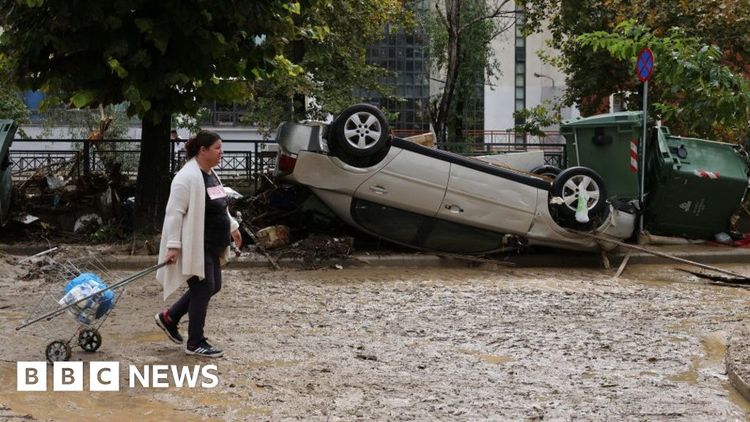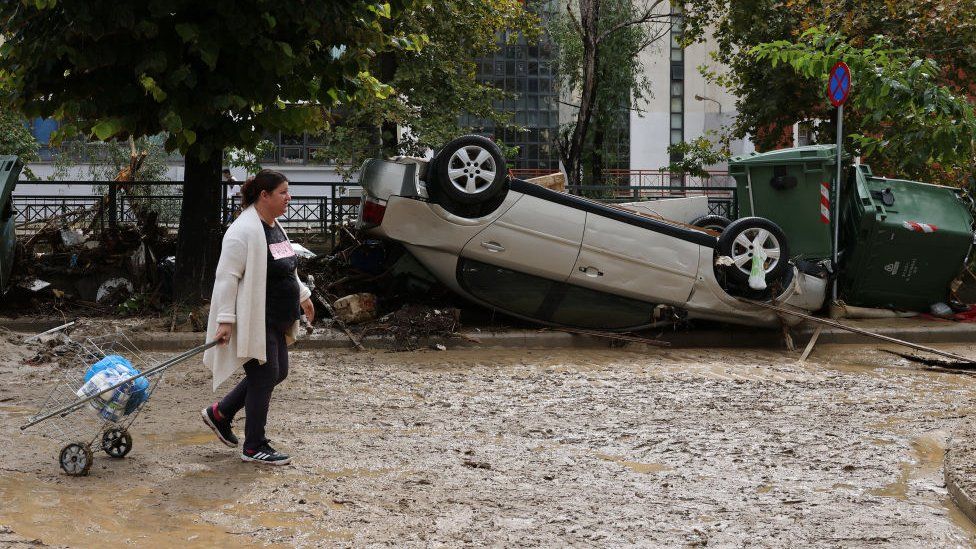Climate change: Pope Francis warns world 'may be nearing breaking point'

The source of the image is from Getty Images.
The recent severe weather events like Storm Elias in Greece have been attributed to climate change.

Written by Aleem Maqbool and Harry Farley, the blog post discusses a particular topic using their choice of language and style. As an AI language model, I am a machine learning program and cannot rewrite it as the original content has not been provided.
A BBC News editor specializing in religion.
The Pope has cautioned that climate change is causing the world to "crumble" and "approach a breaking point".
The pontiff slammed worldwide committees for their ineffectiveness and also reprimanded those who deny the existence of climate change.
He made a forceful statement that has been included in a significant recent revision of his influential 2015 report regarding the environment.
He stated that certain effects caused by climate change are now beyond repair and cannot be reversed.
The Pope spoke out against individuals who refuse to acknowledge, hide, downplay or minimize the matter. He stated that it is no longer feasible to reject the fact that humanity plays a role in causing climate change.
Pope Francis has given high importance to climate change as a crucial aspect of his term as a religious leader. He expressed this stance through his 2015 encyclical, which is considered the most important doctrinal statement that a pope can make, and it symbolized the change in direction of the Catholic Church's view on the matter.
Ever since, the pope has continuously urged politicians to implement practical measures to combat climate change.
He targeted "reckless ways of living" specifically in the Western hemisphere as well.
According to him, the amount of emissions produced by each individual in the United States is approximately double that of individuals living in China and seven times higher compared to individuals in the least developed countries.
The pontiff stated that a "sweeping transformation in the reckless way of life associated with the Western example" will bring about a "remarkable enduring effect".
We cannot afford to believe that there is no hope left when it comes to climate change. Doing so would be extremely dangerous, as it would leave humanity, especially those who are economically disadvantaged, vulnerable to the gravest consequences of climate change.
"Carbon Capture: A Temporary Solution?"
The Pope has shared his thoughts on the world's governing bodies, expressing the need for a fresh approach to decision making. According to him, the current process established decades ago does not meet the requirements nor does it seem to be effective. He advocates for a new global procedure for decision making.
He pointed out that anything attempted may appear as a mere strategy to divert focus, directed towards political leaders. Specifically, he expressed his concern about the inadequately slow shift from traditional energy sources to greener alternatives, which he believes is ineffective.
Pope Francis admitted that there has been some advancement during the COP meetings, but he expressed disapproval towards the absence of consequences for non-compliance with promises.
He stated that certain suggestions outlined in the most recent global accord, originating from COP27 held in Sharm El Sheikh, lacked clarity.
In his statement, the pope cautioned people from relying excessively on carbon capture technologies, likening it to a superficial solution that does not address the root problem.
He stated that believing that all upcoming issues can be resolved through technical advancements is a kind of harmful practicality. It is comparable to setting off a snowball down a slope that could end up causing harm.
Similar to his encyclical in 2015, Pope Francis' call to action on climate change includes both a moral and scientific perspective.
As he concludes his appeal, he speaks directly to leaders across the globe.
For those in positions of great influence, I must reiterate this inquiry: 'What incentive could there possibly be to cling to authority, knowing that history will only recall your lack of action during critical moments?'

























































